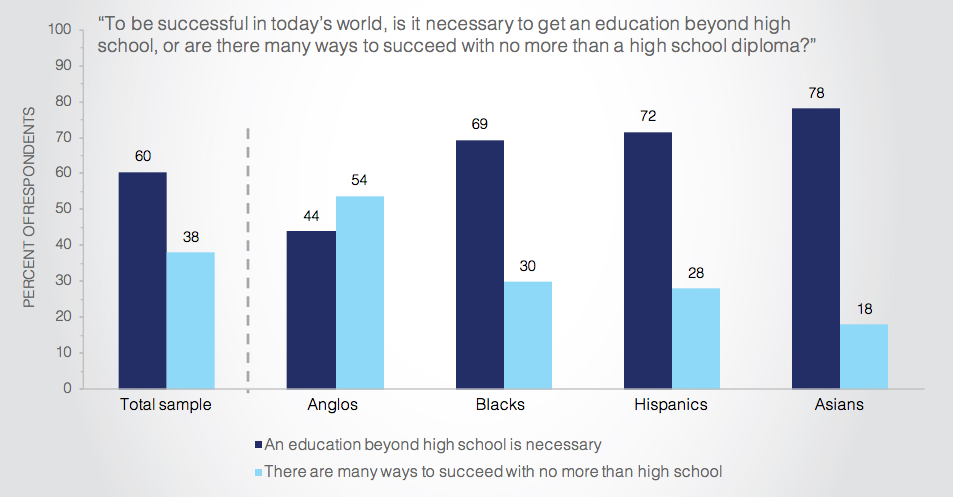This item was originally published on the blog of Raise Your Hand Texas. View the original post here.
We Texans are finally beginning to acknowledge the revolutionary trends that have been redefining the social and political agenda across America and are nowhere more clearly seen than here. The traditional low-skilled, blue-collar path to financial stability has all but disappeared: In today’s high-tech, knowledge-based, fully global economy, the inequalities in income and wealth are growing rapidly, predicated above all else on access to high-quality education and technical skills. At the same time, Texas is at the forefront of the ongoing transformation in the U.S. population, as an earlier generation, predominantly Anglo and now aging, is being replaced by a new generation of Americans, composed largely of immigrants and their children, who are a mix of all the world’s ethnicities.
The restructured economy
The coming together of globalization and automation has created a fundamentally new kind of opportunity structure in America. In today’s economy, if you are doing a job that I can train a low-skilled third-world worker to do, and I pay that third-world worker $10 a day to do the job, I’m not going to pay you $10 an hour. And if you are doing work that I can easily program a computer to do, I will soon be replacing your job with an intelligent machine. That old saying, “What you earn depends on what you have learned,” has never been as true as it is today.
During most of the last century, Texans didn’t need much education to strike it rich. The big money came primarily from buying and selling land and exploiting all the commodities the land could produce: Texas fortunes were built on cotton, timber, cattle, and oil. That resource-based, industrial-era economy has now receded into history. Gone are the days when every high-school graduate could go to work in the oil fields or on a manufacturing assembly line and expect to earn a middle-class wage. Access to a good education has become a more powerful determinant than ever before of a person’s ability to find a job that will pay a living wage in today’s economy. Article continues below chart.

Source: Kinder Houston Area Survey.
Given our historical reliance on natural resources, it is perhaps not surprising that this state has generally shortchanged education. Texas is still today at the very bottom of the 50 states in the proportion of its residents aged 25 and older who have high-school diplomas and 30th in the percentage with college degrees. We cannot allow that low level of achievement to continue if we expect this state to succeed in the twenty-first century. The source of wealth today and tomorrow will have less to do with natural resources and more to do with human resources, with knowledge and skills.
The demographic revolution
Meanwhile, Texas is in the vanguard of the nation’s unfolding demographic transition. The trends are particularly clear in the Houston area. In the course of the last three decades, this traditionally biracial Anglo-male-dominated Southern city has been transformed into the single most ethnically and culturally diverse metropolitan region in the country. According to the most recent census data, Harris County is now 8 percent Asian, 19 percent African-American, 42 percent Hispanic, and just 31 percent Anglo. The census projects that by 2030 Hispanics will comprise a clear majority of the county’s population and the Anglo share will have dropped to less than 20 percent.
The changes are particularly dramatic when age is taken into account. It is only among Harris County residents who are over the age of 63 that Anglos today still constitute a majority of the population. At each younger age group, the percentage of Anglos plummets and the percentage of African Americans, Asians and Latinos surges. Of all Harris County residents aged 19 or younger, 70 percent are now Hispanics or African Americans. In the state as a whole, 60 percent of all Texans who are under the age of 20 are blacks or Latinos.
With their parents working at two or three jobs yet unable to lift their families out of poverty and with very little education themselves and little understanding of how to help their children succeed in the public schools, these young people are facing daunting challenges in their efforts to qualify for decent jobs in today’s economy. Among all the survey respondents who were interviewed in the past 10 years of the annual Kinder Houston Area Survey, just 20 percent of African-American adults and 17 percent of Latinos have college degrees. Half of all the U.S.-born blacks (49 percent) and U.S.-born Hispanics (55 percent) have not obtained any education at all beyond high school; more than a fifth of all black Houstonians and more than a fourth of the U.S.-born Latinos do not have high-school diplomas.
These low levels of educational attainment are not due to any failure among these groups to understand the importance of education in today’s economy. The 2016 Houston survey found that Latinos (at 72 percent) and African Americans (69 percent) were far more likely than Anglos (at just 44 percent) to agree that “for a person to be successful in today’s world, it is necessary to get an education beyond high school” and to reject the suggestion that “there are many ways to succeed with no more than a high-school diploma.” If Latinos and African Americans are not getting the education they need, it is demonstrably not because they do not value that education or recognize its importance. It is because these two communities are by far the most likely to be living in poverty and to be attending overcrowded, underfunded inner-city or rural schools that offer too few of the critical resources that enable young people in general to graduate from high school and go on to college.
Implications for the future
As the demographic realities attest, if too many African Americans and Latinos continue to grow up in Texas unprepared to succeed in the new economy, it is difficult to envision a prosperous future for the state as a whole. No conceivable force will stop Houston or Texas or America from becoming more Asian-American, more African-American, and more Hispanic-American as the twenty-first century unfolds. The only question our generation has been given is, “Okay. How do we make this work?” And the only viable answer is to invest in the skills of this rising generation, to ensure that all of the state’s young people are given full access to the tools they will need to thrive in today’s economy.
If the education and income gaps can be bridged, Texas will be able to capitalize fully on the advantages of having a young, multi-cultural, and multi-lingual workforce and will be well positioned for competitive success as a major international player on the world stage and as a model for all of America as the twenty-first century unfolds. The state’s ability to significantly improve access to quality education from birth through college for all of its residents will be the single most critical factor in establishing the overall level of prosperity this multiethnic society of ours will experience in the years ahead. Our success (or failure) in these efforts will determine the Texas future.

